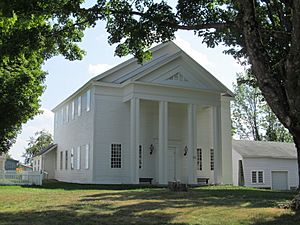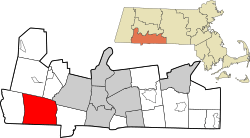Granville, Massachusetts facts for kids
Quick facts for kids
Granville, Massachusetts
|
||
|---|---|---|

Old Meeting House
|
||
|
||

Location in Hampden County in Massachusetts
|
||
| Country | United States | |
| State | Massachusetts | |
| County | Hampden | |
| Settled | 1736 | |
| Incorporated | 1754 | |
| Government | ||
| • Type | Open town meeting | |
| Area | ||
| • Total | 43.0 sq mi (111.4 km2) | |
| • Land | 42.2 sq mi (109.3 km2) | |
| • Water | 0.8 sq mi (2.1 km2) | |
| Elevation | 685 ft (209 m) | |
| Population
(2020)
|
||
| • Total | 1,538 | |
| • Density | 35.758/sq mi (13.806/km2) | |
| Time zone | UTC−5 (Eastern) | |
| • Summer (DST) | UTC−4 (Eastern) | |
| ZIP Code |
01034
|
|
| Area code(s) | 413 | |
| FIPS code | 25-26675 | |
| GNIS feature ID | 0618183 | |
Granville is a small town in Hampden County, Massachusetts. In 2020, about 1,538 people lived there. It is part of the larger Springfield area. The town got its name from John Carteret, 2nd Earl Granville.
Contents
Exploring Granville's Past
Granville was first settled by English colonists in 1736. It officially became a town in 1754. This happened after the Indian wars ended in 1750. Early settlers could get a 100-acre (0.40 km2) piece of land for free. They just had to build a house and plant four acres of hay.
One famous person from that time was Oliver Phelps. He bought 6 million acres (24,000 km2) of land in western New York. This was after the American Revolutionary War. It was the largest land purchase in US history. Granville's population grew fast, reaching 2,100 people by 1810. At that time, it was as big as Springfield. But many settlers later moved west. This was probably because the soil in New England was very rocky. Some of them even started a town called Granville, Ohio.
Historic Buildings and Sites
Many old homes can be seen along Massachusetts Route 57. This is the main road through Granville. The village center, the old center, and West Granville center are all historic areas. They are listed on the National Register of Historic Places.
Important historic buildings include Granville's Old Meeting House. It is known for its amazing sound. There is also the Stevenson house, the West Granville Academy, and the West Granville Church. The village center has an old-fashioned country store. It is famous for its cheese, which is aged in the cellar.
Granville's Water Sources
Granville is important for its water. It has three reservoirs that supply water to nearby cities. The Barkhamsted reservoir provides water for the Hartford area. Cobble Mountain is the main source for Springfield. Westfield reservoir supplies water to the city of Westfield, Massachusetts. A lot of land in Granville is owned by these water companies. Granville also has many active apple orchards.
Granville's Location
Granville is in the southwest part of Hampden County. It is about 18 miles (29 km) west of Springfield. It is also 9 miles (14 km) southwest of Westfield. Massachusetts Route 57 is the main road that goes east and west through the town. Massachusetts Route 189 goes south from the town center to the Connecticut border. Hartford, Connecticut, is about 25 miles (40 km) south using Route 189.
The town of Granville covers a total area of 43.0 square miles (111.4 km2). Most of this, 42.2 square miles (109.3 km2), is land. The rest, 0.81 square miles (2.1 km2), is water.
Granville shares its borders with several other towns. To the north are Blandford and Russell. Westfield is to the northeast. Southwick is to the east. To the south are Granby, Connecticut and Hartland, Connecticut. Finally, Tolland is to the west.
Granville's Population
| Historical population | ||
|---|---|---|
| Year | Pop. | ±% |
| 1850 | 1,305 | — |
| 1860 | 1,385 | +6.1% |
| 1870 | 1,293 | −6.6% |
| 1880 | 1,205 | −6.8% |
| 1890 | 1,061 | −12.0% |
| 1900 | 1,050 | −1.0% |
| 1910 | 781 | −25.6% |
| 1920 | 655 | −16.1% |
| 1930 | 674 | +2.9% |
| 1940 | 668 | −0.9% |
| 1950 | 740 | +10.8% |
| 1960 | 874 | +18.1% |
| 1970 | 1,008 | +15.3% |
| 1980 | 1,204 | +19.4% |
| 1990 | 1,403 | +16.5% |
| 2000 | 1,521 | +8.4% |
| 2010 | 1,566 | +3.0% |
| 2020 | 1,538 | −1.8% |
| 2022 | 1,528 | −0.7% |
Source: United States Census records and Population Estimates Program data. |
||
In 2000, there were 1,521 people living in Granville. There were 556 households and 409 families. About 36.9% of households had children under 18. Most households (63.7%) were married couples. About 27.6% of the population was under 18 years old. The average age in town was 39 years.
Granville Public Library
The public library in Granville started in 1894. In 2008, the town spent about $31,979 on its library. This was about $18 for each person living there.
Schools in Granville
Granville is part of the Southwick Regional School District. This district also includes Southwick and Tolland. Young students go to Woodland School for grades K-2. Then they attend Powder Mill School for grades 3-6. Older students go to Southwick Regional School for grades 7-12.
Places to Visit in Granville
- Granville State Forest
- Granville Center Historic District
- Granville Village Historic District
- Nobel & Cooley Drum Factory
- West Granville Historic District
- Wild Cat Aqueduct
Notable People from Granville
Many interesting people have come from Granville:
- Israel Barlow (1806–1883), an early pioneer of the Latter-day Saint movement.
- Isaac Chapman Bates (1779–1845), a politician.
- Lemuel Haynes (1753–1833), an important African American religious leader.
- Oliver Phelps (1749–1809), a merchant and politician.
- Austin Scott (1848–1922), a historian and college president.
- Sabrina Tavernise (born 1971), a well-known journalist.
Annual Events in Granville
Granville Harvest Fair
The Granville Harvest Fair is a popular event. It happens every October during Columbus Day weekend. People and vendors come from all over New England. The fair stretches along Route 57. It goes from the Granville Village School to the Town Hall. There are shops lining the streets. The main part of the fair is at the school, town hall, and town green.
Until 2012, buses helped people travel between these three spots. Now, the buses go between the school and the Nobel and Cooley Drum Factory. This makes the bus route shorter. The fair mostly features crafts. Many vendors sell handmade items.
Images for kids
See also
 In Spanish: Granville (Massachusetts) para niños
In Spanish: Granville (Massachusetts) para niños







